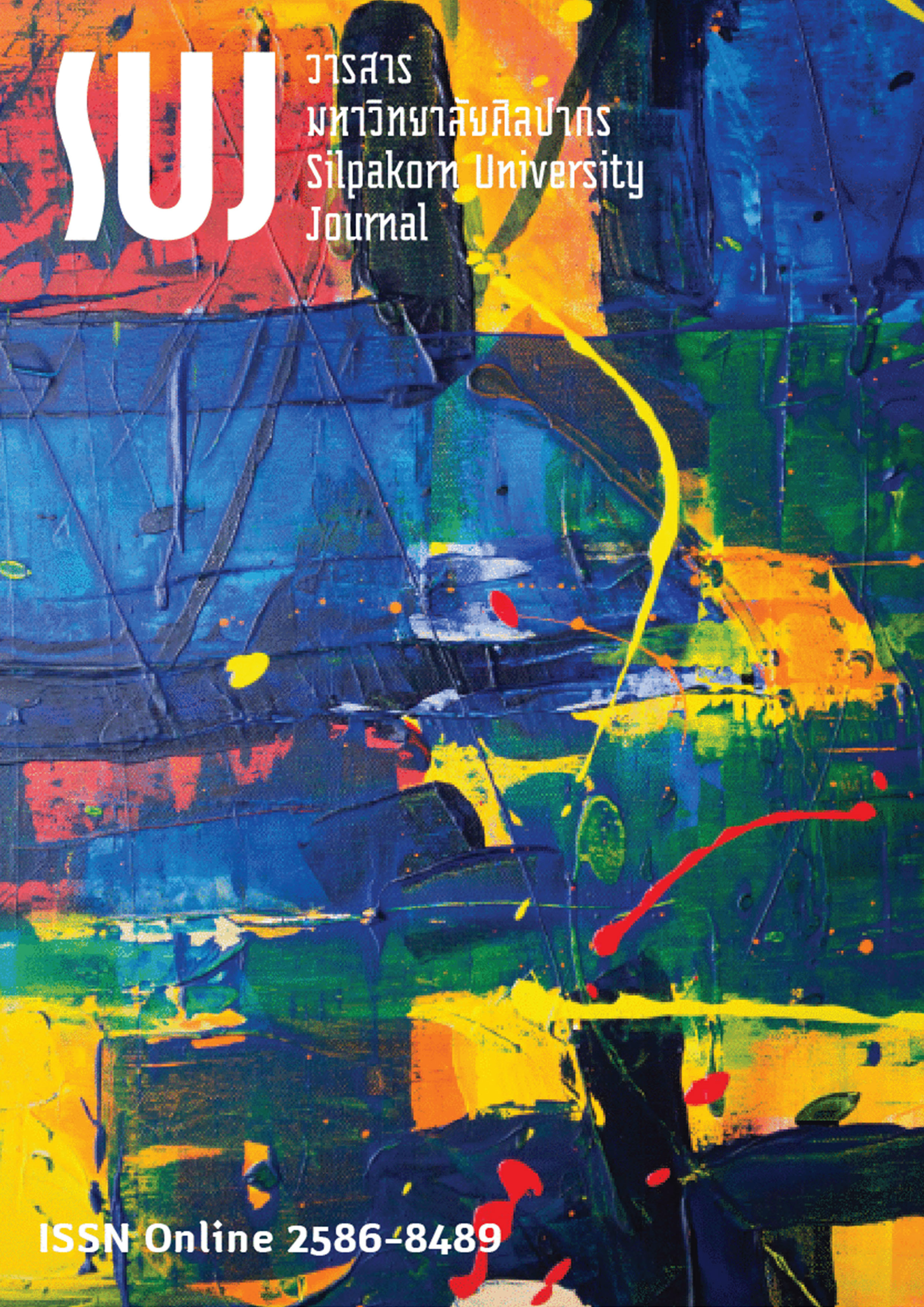พลังแห่งการเยียวยาในภาพยนตร์: กรณีการสูญเสียบุคคลอันเป็นที่รักใน What Dreams May Come (1998) (The healing power of cinema: A case of bereavement in What Dreams May Come (1998))
Main Article Content
Abstract
งานวิจัยเรื่องนี้มุ่งศึกษาภาพยนตร์ เรื่อง What Dreams May Come (กำกับโดย Vincent Ward, 1998) ผ่านมุมมองมนุษยศาสตร์การแพทย์ โดยเน้นสกัดกลั่นพลังแห่งการเยียวยาผ่านเรื่องเล่าการสูญเสียบุคคลอันเป็นที่รักในภาพยนตร์ ผลการวิจัยพบว่า คุณสมบัติแห่งการเยียวยาของ What Dreams May Come ปรากฏชัดขึ้นมาได้ด้วยการวิเคราะห์ตัวบทในฐานะภาพยนตร์แห่งการเปลี่ยนแปลงตัวตน ภาพยนตร์นำเสนอประสบการณ์การสูญเสียบุคคลอันเป็นที่รักโดยท้าทายระยะของความโศกเศร้าอันเป็นคำอธิบายหลักในองค์ความรู้ทางการแพทย์ ภาพยนตร์กอบกู้ตัวละครที่เดินทางไปไม่ถึงระยะการยอมรับ ทั้งยังอนุญาตให้ตัวละครเดินทางวนกลับไประยะแห่งการปฏิเสธได้ อย่างไรก็ตาม ภาพยนตร์เน้นว่าการสนับสนุนทางสังคมมีความสำคัญยิ่งต่อผู้สูญเสีย และสายสัมพันธ์ต่อเนื่องระหว่างบุคคลที่ยังมีชีวิตอยู่กับผู้ล่วงลับเป็นเงื่อนไขสำคัญที่ทำให้บุคคลผู้แตกสลายด้วยความโศกเศร้าเกิดใหม่ด้วยตัวตนที่เปลี่ยนแปลงไป ผลและแนวทางจากการวิจัยครั้งนี้นำไปขยายผลในบริบทแพทยศาสตรศึกษาได้ ในแง่การส่งเสริมจินตนาการทางจริยธรรมของนิสิตนักศึกษาแพทย์ผ่านประสบการณ์รับช่วงในภาพยนตร์
This research aims at investigating the film What Dreams May Come (dir. Vincent Ward, 1998) from a medical humanities perspective, with a focus on extracting the healing power through the portrayal of bereavement in the film. The research unravels the healing potential of the film through transformative cinema—a watching strategy. The film presents the experience of losing a beloved person, challenging the depths of grief as a primary descriptor within the realm of medical knowledge. The film salvages the protagonist who fails to reach the final stage of acceptance and allows for the character to quest back to the denial stage. Nevertheless, the film upholds social support for mourners going through their grief. Within one’s bereavement, a continuing bond between the mourners and the deceased is one of the key factors enabling those who are ruined by grief to rise again with their transformed selves. The research findings and methods can be extended to the medical education context in terms of enhancing moral imagination among medical students through second-hand experiences in cinema.
Downloads
Article Details

This work is licensed under a Creative Commons Attribution-NonCommercial-NoDerivatives 4.0 International License.
References
Armstrong, R. (2012). Mourning Films: A Critical Study of Loss and Grieving in Cinema. Jefferson, North Carolina: McFarland.
Artsanthia, Jintana, & Pomthong, Ruchanee. (2018). Nurses’ role: Case study of psychological care for caregivers of patients with terminal illness (บทบาทพยาบาล: กรณีศึกษาการดูแลด้านจิตใจของผู้ดูแลผู้ป่วยระยะท้าย). Journal of The Royal Thai Army Nurses, 19(1): 1-8.
Blasco, P. G. (2001). Literature and movies for medical students. Family Medicine, 33(6): 426-428.
Buchanan, I. (2010). Dictionary of Critical Theory. Oxford: Oxford University Press.
Davis, P. (2020). Reading for Life. Oxford: Oxford University Press.
Evans, O., & Harper, G. (2021). The healing power of cinema. Studies in European Cinema, 18(1): 1-3.
Frank, A. W. (2013). The Wounded Storyteller: Body, Illness, and Ethics (2nd ed.). Chicago: The University of Chicago Press.
Izod, J., & Dovalis, J. (2015). Cinema as Therapy: Grief and Transformational Film. East Sussex & New York: Routledge.
Kanlayanam, Patriya. (2000). Myth and Religion in What Dreams May Come: A Comparative Study between the Novel and the Film (ตำนานและศาสนาใน วอต ดรีมส์ เมย์ คัม: การศึกษาเปรียบเทียบนวนิยายกับภาพยนตร์). Master’s dissertation, Chulalongkorn University, Bangkok, Thailand.
Kuhn, A., & Westwell, G. (2020). Dictionary of Film Studies (2nd ed.). Oxford: Oxford University Press.
Lueboonthavatchai, Peeraphon. (2007). Grief and interpersonal psychotherapy: Principle and management (อารมณ์เศร้าโศกจากการสูญเสียและจิตบำบัดสัมพันธภาพระหว่างบุคคล: หลักการและแนวทางดูแล). Journal of the Psychiatric Association of Thailand, 52(1): 29-45.
Michael, M. (2018). Hieronymus Bosch’s The Garden of Earthly Delights: The Senses and the Soul in Dream and Awakening. Norderstedt: PubliQation.
Neimeyer, R. A., & Sands, D. C. (2011). Meaning Reconstruction in Bereavement: From Principles to Practice. In R. A. Neimeyer, D. L. Harris, H. R. Winokuer, & G. F. Thornton (Eds.), Grief and Bereavement in Contemporary Society: Bridging Research and Practice, (pp. 9-22). New York & East Sussex: Routledge.
Parkes, C. M. (2011). Introduction: The Historical Landscape of Loss: Development of Bereavement Studies. In R. A. Neimeyer, D. L. Harris, H. R. Winokuer, & G. F. Thornton (Eds.), Grief and Bereavement in Contemporary Society: Bridging Research and Practice, (pp. 1-5). New York & East Sussex: Routledge.
Promsing, Pachcharee, Keeratiyutanawong, Pawana, & Kunsongkeit, Wanlapa. (2016). Factor associated with spiritual care for terminally Ill patients of professional nurses (ปัจจัยที่มีความสัมพันธ์กับการดูแลด้านจิตวิญญาณในผู้ป่วยระยะสุดท้ายของพยาบาลวิชาชีพ). Ramathibodi Nursing Journal, 22(3): 277-292.
Rankin, D. (2020). Film and the Afterlife. Abingdon, Oxon & New York: Routledge.
Sathianphattharanan, Ratsarin, Lueboonthavatchai, Peeraphon, & Dangdomyouth, Pennapa. (2016). Loss experiences of spouses after dying of terminally ill patients at King Chulalongkorn Memorial Hospital (ประสบการณ์การสูญเสียคู่สมรสหลังจากการเสียชีวิตของผู้ป่วยระยะสุดท้าย ณ โรงพยาบาลจุฬาลงกรณ์). Chulalongkorn Medical Journal, 60(2): 185-199.
Silenzio, V. M. B., Irvine, C. A., Sember, R. E., & Bergman, B. E. (2005). Film and Narrative Medicine: Cinemeducation and the Development of Narrative Competence. In M. Alexander, P. Lenahan, & A. Pavlov (Eds.), Cinemeducation: A Comprehensive Guide to Using Film in Medical Education, (pp. 9-18). Abingdon, Oxon: Radcliffe Publishing.
Walter, T. (2000). Grief narratives: The role of medicine in the policing of grief. Anthropology & Medicine, 7(1): 97-114.
Wanna, Ratchanoo, & Lueboonthavatchai, Peeraphon. (2015). Prevalance of complicated grief and associated factors in psychiatric outptients at King Chulalongkorn Memorial Hospital (ความชุกของอารมณ์เศร้าโศกที่ผิดปกติจากการสูญเสียและปัจจัยที่เกี่ยวข้องที่พบในผู้ป่วยนอกจิตเวช โรงพยาบาลจุฬาลงกรณ์). Journal of the Psychiatric Association of Thailand, 60(2): 85-98.
Wattanatornnan, Sarinrat. (2017). Grief and bereavement: The nursing role (ความโศกเศร้าจากการสูญเสียบุคคลอันเป็นที่รัก: บทบาทพยาบาล). Thai Red Cross Nursing Journal, 10(1): 13-21.


